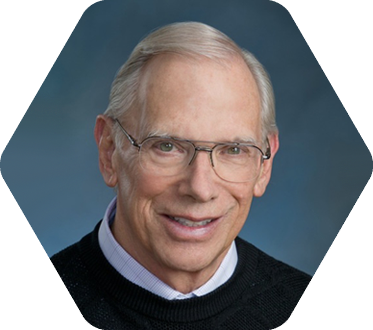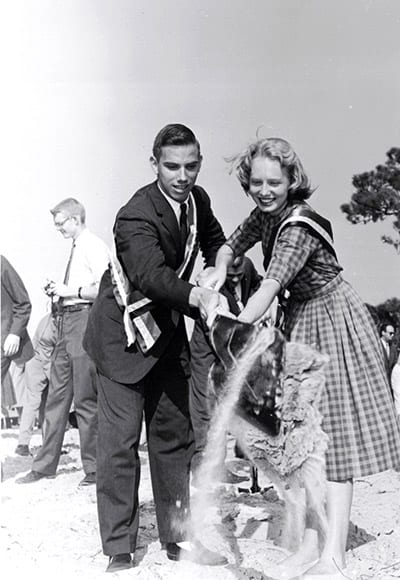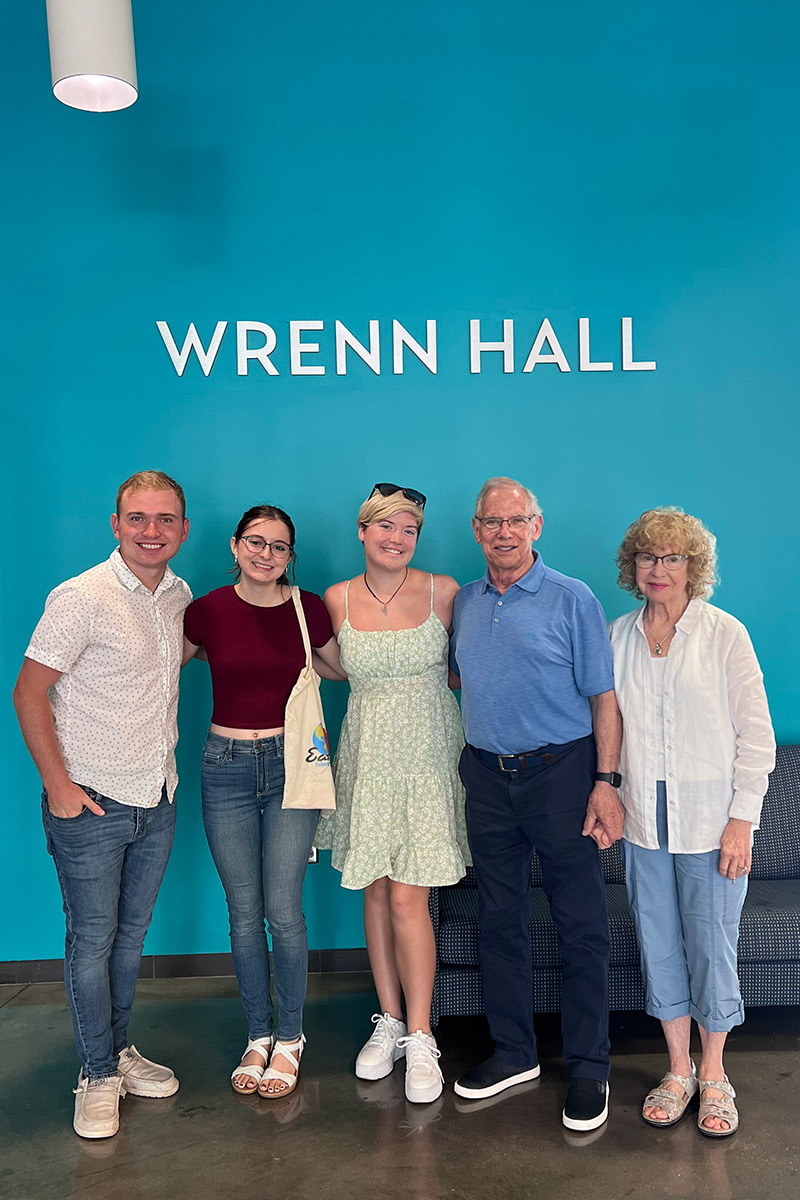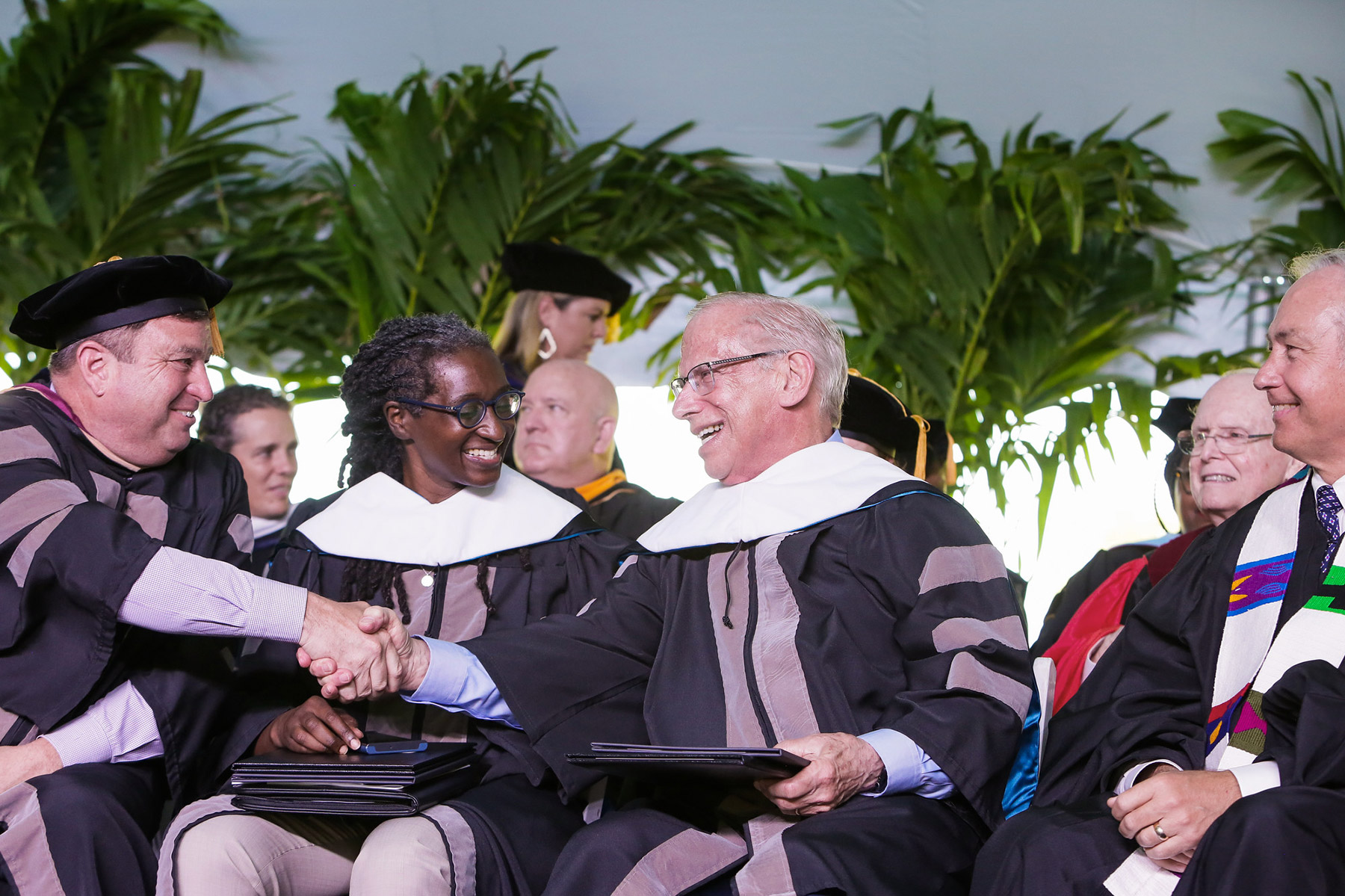Class of 1964
Fortuitous circumstances led Grover Wrenn ’64 to Florida Presbyterian College in 1960 as one of 154 members of the founding freshman class. Hailing from a very small town in North Carolina, he took a summer chemistry course at Western Carolina College from a professor who “lived to teach.” At the end of the course, the professor, Samuel Dexter Squibb, told a few students he had signed a contract to be the first chemistry professor at a brand new school in St. Petersburg, Florida.
Grover was so pleased with his experience in that chemistry course that he wrote FPC for information and accepted an invitation to visit the campus where he met the founding administration and several faculty members. He never applied to any other college. But circumstances of life—marrying and having two children by his junior year—took him away from FPC before graduating.

“The three years I spent at FPC were a truly transformative experience that shaped who I am today. The core curriculum in the liberal arts and mentoring by an extraordinary faculty allowed me to calibrate my moral compass and prepared me to wrestle with the critical questions of life from the time I left there until today,” he says.
In Grover’s years after FPC, he made a lasting mark on the world. He completed his bachelor’s degree in chemistry from Clemson —where he lived in married student housing for $27 a month—and he was awarded a U.S. Public Health Service traineeship to pursue his master’s degree in public health from the University of North Carolina at Chapel Hill.
His time as a graduate student at UNC, and afterward working as a research associate there, resulted in discoveries that improved conditions for workers who were exposed to toxic chemicals. He led a large-scale epidemiological and occupational health study of the rubber and plastics industry. In the process, he became familiar with the manufacture of vinyl chloride—a gas which was used as a general anesthesia for a short time after World War II and the building block for more than half of all plastics at the time, and which was previously regarded as relatively innocuous. Near the end of Grover’s time at UNC, vinyl chloride was found to cause a rare and fatal form of liver cancer in men working in the plastics industry.
That research led to a six-year stint at the Occupational Safety and Health Administration in its early days, where Grover directed the development of most of the major health standards issued in OSHA’s 50-plus year history. Those standards still protect workers today from the hazards of exposure to vinyl chloride, lead, benzene, cotton dust, asbestos, arsenic, commercial diving, sanitation standards for farmworkers, and other health and safety hazards.
After leaving OSHA, Grover founded Environ International, a consulting company that provided health and environmental risk assessments for exposure to toxic substances in air, groundwater, the workplace, and chemical products. He and his co-founders took the company public in the early 1990s. Today, Environ is the risk assessment component of Ramboll, a global environmental and engineering consulting company with 17,000 employees in 35 countries providing sustainable solutions for the future.
In his work, Grover relied heavily on the ethical framework that his time at FPC had given him.
“My education in the sciences provided an important knowledge base for the technical aspects of my work. But my liberal arts education was far more important,” Grover says.

Grover breaks ground on FPC’s new campus—the current campus of Eckerd College—in 1961.
“Many of the toughest decisions I had to make in my career were value-based decisions, often in response to conflict or controversy—they weren’t technical choices. FPC provided me the confidence to confront the most difficult challenges that I have faced in the sixty years since.”
He remembers specifically the transformative effect of attending FPC during the Civil Rights Era. Being from the rural, segregated South, his FPC education led him to question the values system under which he had been raised. He had seen the evils of systemic racism before leaving home, he says, but the critical thinking skills gained at the College gave him the insight to examine the values he had been taught and to escape that worldview.
“When the founding freshmen arrived in September 1960, we were greeted by the faculty and treated as adults,” he recalls. “We were told that all of us were there for the same reason. We were all on the same journey of learning—including the founding faculty who would be our teachers and mentors but who said that in teaching us they would also learn from us.” He said that the resignation of all but two of the faculty in 1962 in protest of a decision by the Board of Trustees not to admit the first Black applicant was a powerful lesson of moral courage.
The ability to acknowledge and deal with difficult truths would prove to be useful in his service to the College as well. He reconnected with Eckerd in 1990, joining the Board of Trustees. In 2000, the Board discovered millions of dollars had been transferred from the College’s endowment without the Board’s approval. The trustees personally restored the endowment through their own giving, and Grover chaired the search committee that led to the selection of Donald R. Eastman III as the College’s fourth president.
“I spent my career helping clients solve complex problems. At Eckerd, it was just different kinds of problems,” he says. “I put a lot of time and effort into my service as a trustee. I believe that I made a difference, and my experience as a trustee strengthened my relationship to the College.”
After 22 years of dedicated service—including chairing the College’s $86 million Many Experiences, One Spirit fundraising campaign—he resigned from the Board in 2012. He has spent the ensuing years traveling the world with Suzie, pursuing his passion for wildlife and nature photography, and enjoying his children and grandchildren.
But it turned out his final chapter with the College was not yet written. In 2023, after an 11-year hiatus, he has rejoined the Board as an honorary trustee.
“I welcome the opportunity to be more closely connected to the College again and to its future,” he says.
Board Chair Ian Johnson ’89 congratulates Grover on his honorary degree at Eckerd’s 60th Commencement.




